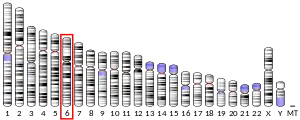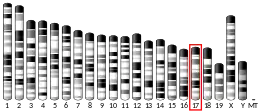FOXP4
Forkhead box protein P4 is a protein that in humans is encoded by the FOXP4 gene.[5]
This gene belongs to subfamily P of the forkhead box (FOX) transcription factor family. Forkhead box transcription factors play important roles in the regulation of tissue- and cell type-specific gene transcription during both development and adulthood. Many members of the forkhead box gene family, including members of subfamily P, have roles in mammalian oncogenesis. This gene may play a role in the development of tumors of the kidney and larynx. Alternative splicing of this gene produces multiple transcript variants, some encoding different isoforms.[5]
References
- GRCh38: Ensembl release 89: ENSG00000137166 - Ensembl, May 2017
- GRCm38: Ensembl release 89: ENSMUSG00000023991 - Ensembl, May 2017
- "Human PubMed Reference:". National Center for Biotechnology Information, U.S. National Library of Medicine.
- "Mouse PubMed Reference:". National Center for Biotechnology Information, U.S. National Library of Medicine.
- "Entrez Gene: FOXP4 forkhead box P4".
Further reading
- Katoh M, Katoh M (2005). "Human FOX gene family (Review)". Int. J. Oncol. 25 (5): 1495–500. doi:10.3892/ijo.25.5.1495. PMID 15492844.
- Strausberg RL, Feingold EA, Grouse LH, et al. (2003). "Generation and initial analysis of more than 15,000 full-length human and mouse cDNA sequences". Proc. Natl. Acad. Sci. U.S.A. 99 (26): 16899–903. doi:10.1073/pnas.242603899. PMC 139241. PMID 12477932.
- Lu MM, Li S, Yang H, Morrisey EE (2003). "Foxp4: a novel member of the Foxp subfamily of winged-helix genes co-expressed with Foxp1 and Foxp2 in pulmonary and gut tissues". Gene Expr. Patterns. 2 (3–4): 223–8. doi:10.1016/S1567-133X(02)00058-3. PMID 12617805.
- Teufel A, Wong EA, Mukhopadhyay M, et al. (2003). "FoxP4, a novel forkhead transcription factor". Biochim. Biophys. Acta. 1627 (2–3): 147–52. doi:10.1016/S0167-4781(03)00074-5. PMID 12818433.
- Lu MM, Li S, Yang H, Morrisey EE (2002). "Foxp4: a novel member of the Foxp subfamily of winged-helix genes co-expressed with Foxp1 and Foxp2 in pulmonary and gut tissues". Mech. Dev. 119 Suppl 1: S197–202. doi:10.1016/S0925-4773(03)00116-3. PMID 14516685. S2CID 935988.
- Li S, Weidenfeld J, Morrisey EE (2004). "Transcriptional and DNA Binding Activity of the Foxp1/2/4 Family Is Modulated by Heterotypic and Homotypic Protein Interactions". Mol. Cell. Biol. 24 (2): 809–22. doi:10.1128/MCB.24.2.809-822.2004. PMC 343786. PMID 14701752.
- Ota T, Suzuki Y, Nishikawa T, et al. (2004). "Complete sequencing and characterization of 21,243 full-length human cDNAs". Nat. Genet. 36 (1): 40–5. doi:10.1038/ng1285. PMID 14702039.
- Gerhard DS, Wagner L, Feingold EA, et al. (2004). "The Status, Quality, and Expansion of the NIH Full-Length cDNA Project: The Mammalian Gene Collection (MGC)". Genome Res. 14 (10B): 2121–7. doi:10.1101/gr.2596504. PMC 528928. PMID 15489334.
- Hannenhalli S, Putt ME, Gilmore JM, et al. (2006). "Transcriptional genomics associates FOX transcription factors with human heart failure". Circulation. 114 (12): 1269–76. doi:10.1161/CIRCULATIONAHA.106.632430. PMID 16952980.
This article is issued from Wikipedia. The text is licensed under Creative Commons - Attribution - Sharealike. Additional terms may apply for the media files.



